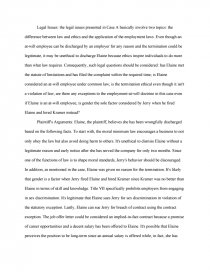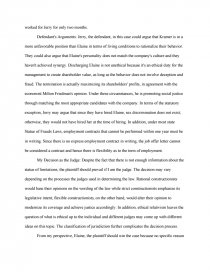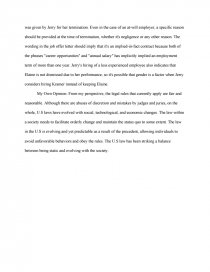Difference Between Law and Ethics and the Application of the Employment Laws
Essay by caesarzzr • June 15, 2013 • Essay • 873 Words (4 Pages) • 1,703 Views
Essay Preview: Difference Between Law and Ethics and the Application of the Employment Laws
Legal Issues: the legal issues presented in Case A basically involve two topics: the difference between law and ethics and the application of the employment laws. Even though an at-will employee can be discharged by an employer for any reason and the termination could be legitimate, it may be unethical to discharge Elaine because ethics inspire individuals to do more than what law requires. Consequently, such legal questions should be considered: has Elaine met the statute of limitations and has filed the complaint within the required time; is Elaine considered an at-will employee under common law; is the termination ethical even though it isn't a violation of law; are there any exceptions to the employment-at-will doctrine in this case even if Elaine is an at-will employee; is gender the sole factor considered by Jerry when he fired Elaine and hired Kramer instead?
Plaintiff's Arguments: Elaine, the plaintiff, believes she has been wrongfully discharged based on the following facts. To start with, the moral minimum law encourages a business to not only obey the law but also avoid doing harm to others. It's unethical to dismiss Elaine without a legitimate reason and early notice after she has served the company for only two months. Since one of the functions of law is to shape moral standards, Jerry's behavior should be discouraged. In addition, as mentioned in the case, Elaine was given no reason for the termination. It's likely that gender is a factor when Jerry fired Elaine and hired Kramer since Kramer was no better than Elaine in terms of skill and knowledge. Title VII specifically prohibits employers from engaging in sex discrimination. It's legitimate that Elaine sues Jerry for sex discrimination in violation of the statutory exception. Lastly, Elaine can sue Jerry for breach of contract using the contract exception. The job offer letter could be considered an implied-in-fact contract because a promise of career opportunities and a decent salary has been offered to Elaine. It's possible that Elaine perceives the position to be long-term since an annual salary is offered while, in fact, she has worked for Jerry for only two months.
Defendant's Arguments: Jerry, the defendant, in this case could argue that Kramer is in a more unfavorable position than Elaine in terms of living conditions to rationalize their behavior. They could also argue that Elaine's personality does not match the company's culture and they haven't achieved synergy. Discharging Elaine is not unethical because it's an ethical duty for the management to create shareholder value, as long as the behavior does not involve deception and fraud. The termination is actually maximizing its shareholders' profits, in agreement with the economist Milton Friedman's opinion. Under these circumstances, he is promoting social justice through matching the most appropriate candidates with the company. In
...
...


